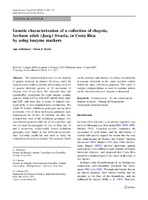Genetic characterization of chayote, Sechium edule (Jacq) Swartz, in Costa Rica by using isozyme markers

Fecha
2007Autor
Abdelnour-Esquivel, Ana
Rocha, Oscar
Metadatos
Mostrar el registro completo del ítemResumen
We established protocols for the analysis of genetic diversity in chayote (Sechium edule) by using isozyme markers, thereby determining the level of genetic diversity present in 42 accessions of chayote from Costa Rica. We obtained clear and reproducible zymograms for eight enzyme staining systems: PGM, 6-PGD, PGI, IDH, MDH, SOD, SKD, and EST, and were able to score 14 putative loci. Eight of the 14 loci examined were polymorphic. We found 35 distinct multilocus genotypes among these accessions. Five of these multilocus genotypes were homozygous for all loci. In addition, our data also revealed that most of the multilocus genotypes (24) were heterozygous for only one of the eight loci, and the rest were heterozygous for two or three loci (9 and 4 accessions, respectively). Seven multilocus genotypes were found in two different accessions.
Dice similarity coefficient was used to study the relationship between accessions. This analysis, based on the presence and absence of alleles, revealed that accessions collected in the same location seldom shared the same multilocus genotype. The value of isozyme polymorphisms as tools to continue studies on the characterization of chayote is discussed.
Fuente
Genetic Resources and Crop Evolution February 2008, Volume 55, Issue 1, pp 163–170Compartir
Métricas
Colecciones
- Artículos [40]

